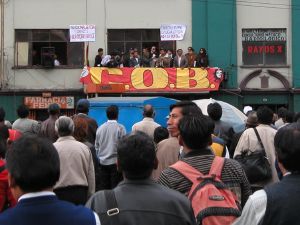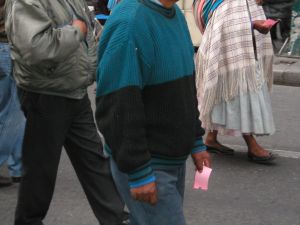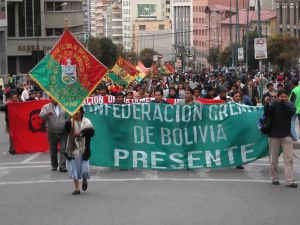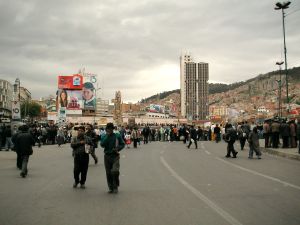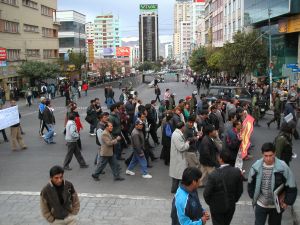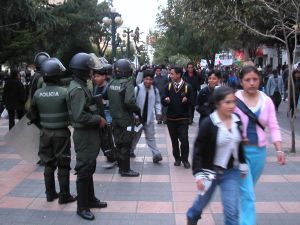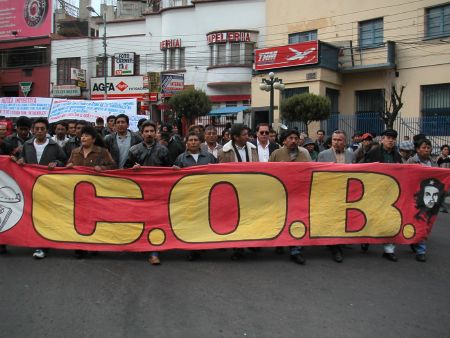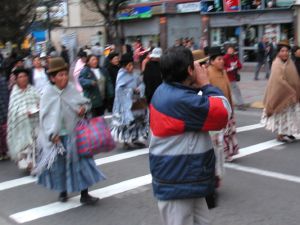Still in Lima
04.30.2004Too busy to post updates. But I'm taking lots of pictures, and we've taken some amazing group trips outside the city. Today's the last full day, just finished lunch after the final presentations. Tonight we're going out dancing, then off to the airport tomorrow afternoon, heading back to La Paz. This trip was totally worth it — some great people, amazing (mis)adventures, and the first good hot shower I've had in months.
In Lima
04.26.2004Just a short note. I'm in Lima, safe & sound. The conference is interesting, at least getting to hang out w/ some new/cool people from all over. I'm presenting at a small panel in a half hour, so I've gotta run. But I hope to post more later. Ciao!
Tango #1
04.25.2004Took my first tango lesson yesterday afternoon. It was both more & less difficult than I'd imagined. Alison (who I'm not dating) thinks I'm doing well for my first time. But it's completely different from anything else I've ever done (not that I've ever actually taken a dance class). And my arms are terribly out of shape.
Continue reading "Tango #1"Almost there
04.24.2004Just finished running most of my statistical models. It took me until 5:30am, but it's almost finished. All except models involving electoral volatility, since I still haven't built the variable. I'll do that in Lima. Meanwhile, stats-guru Nenad is double checking some of my results. Thanks a million.
Continue reading "Almost there"Taking a break
04.23.2004I fly to Lima Sunday. In the meantime, I'm wrapping up a paper on party system differences between Bolivia's east & west, knee deep in OLS (ordinary least squares) regressions, p-values, and all that fun stuff.
Continue reading "Taking a break"Reading hate mail can be interesting. I wonder why people waste their time writing such drivel. Of course, if you post such trash (and anonymously) on my blog, one wonders why. If you don't like me, why bother reading my personal diary day in day out? Obsession, perhaps? Or maybe you didn't realize that I can track IP numbers?
(Another) snapshot of two Bolivias
04.22.2004This is mostly for Eduardo, who commented on the problem of voting support for governments in Bolivia. Since the country is a model of "parliamentarized presidentialism" (the only one in the world), it doesn't elect presidents directly, but by parliamentary election. Governments are comprised of coalitions. This leads many to argue that presidents lack legitimacy. Again, this depends on regional context. Here's a graph showing vote shares for all parties members of the incoming government coalition in any given election:
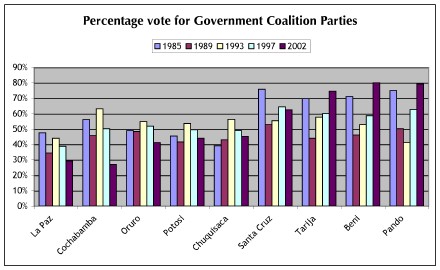
Notice that vote shares in "media luna" departments are higher than in Andean departments. Dramatically so, in many cases. So. Yes. Andean voters are disenfranchized, since they tend to vote for parties that don't win any government power. Not in the east, which over-determines the incoming government. Also, notice a dramatic difference between vote shares in the 2002 election, where coalition parties won no less than 60% in the "media luna" but took less than 30% in La Paz & Cochabamba. Average vote share across elections for incoming coalitions is 62% in the east, 46% in Andean departments.
Keep in mind that each department's an independent electoral district. Victories for coalition parties in the east translate to large chunks of the parliament (they tend to take all eastern senate seats).
Also, the dramatic east-west difference increases if you look at urban-rural voting patterns. Except for El Alto, voting patterns in Andean cities (La Paz, Oruro, Potosí, Sucre) resemble "media luna" patterns. There's no similarly dramatic urban-rural divide in the east. This is true for all the data (such as in the previous post, below).
-----
NOTE: Figures for 1997 are adjusted. I excluded CONDEPA from the coalition figures, since it was kicked out of the coalition after a year. Including CONDEPA increases La Paz' "coalition" vote to 77.1%, w/ almost no effect on other departments.
See related post here.
A snapshot of two Bolivias
04.22.2004Lately, there's talk of "two Bolivias" — between the eastern departments of the "media luna" (Santa Cruz, Tarija, Beni, Pando) and the Andean departments (La Paz, Cochabamba, Oruro, Potosí), w/ Chuquisaca playing an intermediate role (recently leaning towards the "media luna" side). This difference always existed, but it's been exacerbated after October's "guerra del gas" — in which the Andean altiplano rose up to protest the export of natural gas (which rests in "media luna" departments).
But. Do these regional differences reflect in electoral data? That's a question I ask in a paper (hopefully finished before the end of the weekend). I've already crunched the numbers, after a few trips to the Corte Nacional Electoral (CNE). And. Yes. There are two Bolivias. Here's a little bit of the data I looked at:
The graph below shows by-department measures for "effective number of parties" (ENP). The measure — developed by Laakso & Taagepera (1979)* — estimates the number of "effective" parties (those worth counting) in a political system. A characteristics of a "consolidated" party system is that it has a stable number of parties, and that these are few in number (a "good" ENP value for a multiparty system is between 3-4). You can calculate ENPV (using votes) or ENPS (using lower house seats). The difference between the two, in the Bolivian case, is slight (since it uses PR electoral formulas w/ low Gallagher index of disproportionality measures).
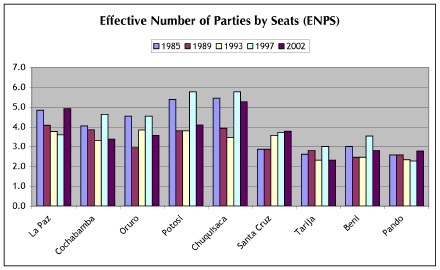
Notice the dramatic difference in structure between Andean & "media luna" departments. Here, there's 2-3 effective parties (a slight increase in Santa Cruz' figures could be accounted by massive immigration from the west).
The next graph shows by-department vote percentages for the "systemic" parties (ADN, MIR, MNR). These three parties were the largest in the transition-to-democracy period. Much of the current criticism of the party system, including the post-October meme that the parties are no longer legitimate, depends on regional context.
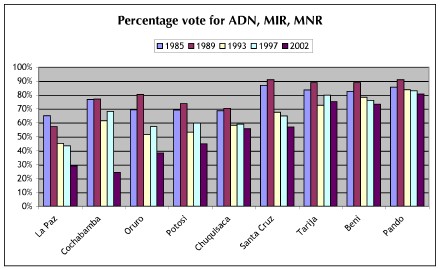
Notice the dramatic drop in votes for these three in the Andean departments, while the vote structure remains steady (and high) in the east. Also, these parties' vote share in 2002 was still over 50% in all of these (including Chuquisaca) — over 70% for Tarija, Beni, and Pando. Again, the Santa Cruz drop could be attributed to recent immigration trends as westerners move to the city — into slum neighborhoods that tend to vote for UCS (a populist party). Still, lowest figures for Santa Cruz are close to the highest for La Paz.
Finally, this graph shows by-department vote percentages for the MNR — the party of deposed president, Gonzalo Sánchez de Lozada.
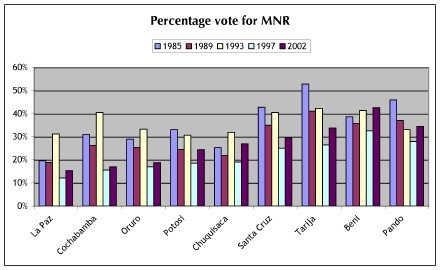
Notice that MNR votes were always higher in the east, but remained high. MNR votes were lowest in the Andean west, and fell over time — especially in populous La Paz & Cochabamba. Look at the figures w/ the other graphs in context. In the "media luna" departments, the MNR regularly wins more than 30% of the vote (even in elections it lost).
What that means is that the party system meets many of the conditions for "consolidation" in the Santa Cruz, Tarija, Beni, and Pando. The Andean half of the country, on the other hand, has a highly unstable party system, which actually changes dramatically between elections. In the 1990s, CONDEPA dominated La Paz (but had no impact in the east), before fading into insignificance. In 2002, MAS & NFR (two new populist parties) preside over a virtual two-party system in Cochabamba, w/ no impact in the east. There's no longer a "national" party system; parties center on regional constituencies — and that might be bad news.
-----
*: See Laakso and Taagepera, “‘Effective’ Number of Parties: A Measure with Application to West Europe,” Comparative Political Studies 12, no 1 (1979): 3-27. I posted the basic formula (w/ explanation) here.
See related post here.
On the front lines
04.21.2004Just spent 15 minutes near the university student barricades, talking to some of them. I'll post some pictures tomorrow. The fact that my eyes are burning, and I can't stop sneezing, is evidence that I arrived minutes after the police responded w/ tear gas. One of the students also told me they'd recovered an unexploded frag grenade, as well as some rubber bullets. While I was near the barricades, a burst scattered us, and I took cover behind the corner of a building.
Continue reading "On the front lines"Rumors & rumors
04.21.2004For the first time in years, rumors of a possible military coup have captured the nation's imagination. It's gone from whispers in certain neighborhoods, to occupying the front page of newspapers three days in a row. And while I think it's unlikely, the attention is troublesome.
Continue reading "Rumors & rumors" at Southern Exposure
Posted by Miguel at 05:18 PM | Permalink
Parliament, days after
04.21.2004This is a picture of the side of the parliament building days after a disgruntled ex-miner blew himself up (on 30 March). The blast killed three, wounded ten, and blew out all the windows in the building, as well as many across the street (the Ministry of the Presidency).
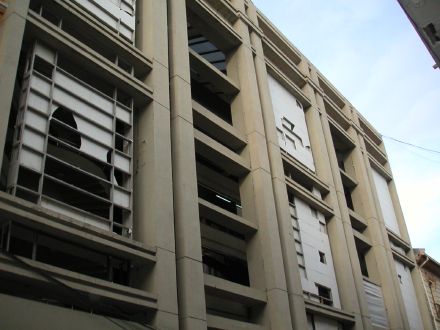
Cooking (w/o gas)
04.21.2004One of the things I didn't know before moving to La Paz is that most apartments don't have kitchens. That is, they have a room designated a "kitchen" — but they don't have kitchens. I never bothered to ask about my first apartment, since I just assumed (as is the case in Michigan) that apartments come at least w/ a stove and refrigerator. Not here.
So. I'm learning to improvise as much as possible. I can make sandwiches & simple things w/ the little fridge I bought. And I can make tea & coffee w/ my electric water boiler. But I'm trying to expand my repertoire. Scouring the little ZATT supermarket near my apartment.
 It finally dawned on me that I could make quite a few things. I can make spaghetti w/ Ramen noodles (sans powder) & cold marinara sauce. Not ideal, but passable.
It finally dawned on me that I could make quite a few things. I can make spaghetti w/ Ramen noodles (sans powder) & cold marinara sauce. Not ideal, but passable.
And I can make mashed potatoes. I just have to boil the water, while mixing salt & butter in the bottom of a mug. Add the potato flakes. Add hot water & cover w/ a plate. Sure, it's not Grama's homemade mashed 'taters, but it'll do.
When I'm back in Michigan in 90 days, I plan to spend several days just cooking.
2 & 11
04.20.2004Got a birthday package in the mail from Andy. Out of the blue, he decided to look up some comics & send them along to me. Thanks for Global Frequency #11 & The Authority #11 — you remembered rightly.
Continue reading "2 & 11"Lost in Translation
04.19.2004The movie's a pretty apt metaphor for my life. In a strange land, don't seem to understand the language. I'm an insomniac Bill Murray who still hasn't met his Scarlett Johansson.
Sunday out & about
04.19.2004Surprised by a phone call from Alison (another fellow Fulbrighter) & invited out to a late lunch. Seems both of us are introverts, and really needed someone to talk to. Dating (in general, but specifically in La Paz) is difficult. Much advice given all around.
Personal revelation: I don't like crowds or lots of friends. I don't. I tend to move in a small circle of very close friends, usually one person who's my "best" friend who I spend most of my time w/. I don't really have that in Bolivia, so spending a whole day w/ someone just talking, getting & giving advice (especially about dating & exes & all that) was a nice reminder of home.
The conclusions we came to are: I'm quite in touch w/ my feminine side. No surprise there, we did have an entire conversation on exfoliants. But that my problem w/ dating's that I don't have "layers." See, I try to warn dates of that early on — what you see's what you get, there's nothing hidden or secret or tucked away. Apparently, women like layers. To peel off over time. Which explains my one-month dating average — I've no layers, I'm not "mysterious" or whatever. You read my blog & you quickly discover who I am. Or should I try to cultivate a "mysterious" persona? Anywho.
Lunch became an entire day out. We went to Hotel Europa for a spa — which in Bolivia doesn't mean facials & mud masks, just sauna stuff. My first time in a sauna in four years, and a much needed sweatbath. A few laps in the pool, a jar of lemonade, and one of the pleasantest conversations in a long time. Both of us grew up in working class, immigrant backgrounds, so interesting growing up experiences.
After sauna, off to a quick bite before Return to Cold Mountain. Good flick. Alison's take's that Jude Law's too hot to die; while I can think of worse ways to go than being kissed by Nicole Kidman. But I really enjoyed the Blue Ridge accents, which reminded me of some Coates family reunions — especially the Missouri (pronounced "Mehsurah") branch of the family.
The only bad moment was when I walked into a hook sticking out of a telephone pole, nearly shattering my glasses & poking my eye out. I finally went home & fell asleep listening to Cat Power.
Crunching numbers (preliminary thoughts)
04.16.2004I've started crunching electoral statistics. Still only early on, since I first have to manually input all the electoral data into various Excel spreadsheets. That's six elections (1980, 1985, 1989, 1993, 1997, 2002), nine national departments, and two elections (1997, 2002) after Bolivia adopted the MMP (Multi-Member Proportional) electoral system similar to Germany's (creating 68 single-member districts). Not done crunching the numbers for various statistics (especially at the disaggregated level), but some preliminary observations:
The idea for adopting the MMP system — which uses a two-tiered ballot structure — was to increase the connection between parties & voters. In MMP systems, voters elect a district representative; the second part of the ballot completes the lower house w/ proportional representation (PR) to compensate. Essentially, MMP is a variation on PR. It's supposed to make parties work harder at establishing (& keeping) local constituencies.
Seems the plan backfired. Introduction of the MMP system increased the effective number of parties (increasing political fragmentation) — while discouraging large parties from heavily engaging in local districts (since larger parties only have to win large chunks of PR-list votes) and encouraging small parties (since winning a "uninominal" (single-member district) seat can take as little as 18%). The new rules essentially reward small, radical, clientelistic parties.
Even more ironic, blank votes (which are high & increasing after adopting MMP) are actually higher in the uninominal part of the ballot. I've not yet worked the figures for Potosí (the department w/ highest blank ballots), but in 1997 Chuquisaca, one uninominal contest reported 13.3% blank votes. Adding null votes, it's 17.1%. That means 1 in 6 voters didn't vote for any of the 12 potential candidates in that district. Insane.
I'll join the ILDIS researchers who recently decided (for different reasons) to suggest abandoning MMP & returning to a more traditional PR electoral formula.
Heading into the weekend
04.16.2004Finally spoke to M on the phone. She's been sick, which I guess is a decent excuse for not hearing from her for a week. I'll try (again) to find her at home this weekend to try cheering her up.
Continue reading "Heading into the weekend"COB marches despite everything (anatomy of a march)
04.16.2004Even though Mesa handed the new Ley de Hidrocarburos (which includes many of the changes the COB demanded) to Congress — and published in full text in every newspaper yesterday — the COB (Central Obrera Boliviana) marched. And although Solares pointed out that their numbers were lower than in the Juan Lechín heyday of the 1950s-70s, I estimated the total number of marchers between 1,800-2,000. This included some hundred of from the COB, several hundred gremialistas, and at least a hundred of the students on strike demanding admittance to the university despite flunking the entrance exam. I managed various pictures, having seen the pre-march speeches & the march itself. Click on images to see larger version.
Continue reading "COB marches despite everything" at Southern Exposure
Posted by Miguel at 04:39 PM | Permalink
Trivialities
04.15.2004I'm starting to get over my flu, finally. Stephen tried to scare me into thinking I had TB, but I feel much better now. I somehow managed to spend several past nights hanging out. Running into Matthew (a French blogger) & Aggie on Monday, then Stephen (fellow Fulbrighter) & Mirtha last night.
I might move to San Pedro when I get back from Lima. Matthew's through w/ his apartment; it's about half what I pay for rent right now. And since I'm packing up for a long Lima (Peru) trip, I might as well just pack up for a third move, eh? Not like I've much to move.
Oh, yes, I'm going to Lima in ten days. There's a big regional Fulbright all-expense-paid meet-and-greet. So. Why not? It could turn out a fun trip — and the program has some interesting tourist getaways planned.
Did my first interview of an Aymaran intellectual this morning. Interesting experience. It's good, obviously, to have a wider variety of interview subjects. But I wasn't expecting such a long interview (almost an hour, most are less than 30 minutes). And he's the first person to request a copy of my cassette, as well as a printed transcript (part of Aymara culture). But. He offered me Victor Hugo Cardenas' (former vice president) phone number & suggested I interview him. Sounds like a plan.
This afternoon's plans include checking on some airline tickets, watching the COB march something around 4pm, and meeting Matthew to see his apartment (the one I might rent). Did I mention his apartment's five blocks from a prison?
Cabinet shake-up
04.14.2004Mesa re-arranged his cabinet last night w/ four changes, including giving MAS control of the Ministry of Indigenous Affairs. The government's also now taking a hard line against protests, arguing that it's tried to negotiate, but now they're going to govern. Other announcements include a date for the gas referendum (18 July) & a decision to sell gas to Argentina, but not to Chile.
Continue reading "Cabinet shake-up" at Southern Exposure
Posted by Miguel at 04:57 PM | Permalink
Bolivia news roundup
04.13.2004Coca production in Yungas increases; Mesa faces opposition to possible sale of gas to Argentina; a reduction in executive spending means little savings; Ley de Hidrocarburos still unchanged.
Continue reading "Bolivia news roundup" at Southern Exposure
Posted by Miguel at 05:01 PM | Permalink
Pleasant surprises
04.13.2004Woke up this morning to a phone call from Stephanie. From Singapore. Just wanted to cheer me up, which she did. It's so good to hear a long-familiar voice on the other end of the line. She also mentioned I should post more "culture clash" type stories on my blog. I'll get right on that. Meanwhile, I'm still nursing a lingering sore throat.
The Passion of Mel Gibson's Christ
04.13.2004After finally seeing The Passion of the Christ, I figure I can weigh in w/ an educated opinion on the highly polemic film. First, I don't think the film's antisemitic. Secondly, I don't think the film deviated from the "message" of Jesus. Third, I think it was a pretty faithful portrayal of standard Catholic traditions.
Continue reading "The Passion of Mel Gibson's Christ"Easter
04.11.2004OK. I'll admit it. I'm having a pretty lame Easter. First, I came down w/ a flu & didn't go to Copacabana, a lovely pilgrimage town on Lake Titicaca. Then, I had to go to Easter Vigil alone in San Miguel, which only made me miss Kalamazoo & St. Tom's all the more. Today, I'll go see The Passion of the Christ alone this afternoon. I don't mind spending time alone, I'm quite used to it. It's just disappointing when you've plans for the weekend & they all go pfft w/o explanation. I've given up on waiting for the phone to ring.
I did go to lunch & coffee yesterday w/ Daniel, Silvia, and Luciana. Which reminds me what a true friend's like.
Mission: Pixies
04.10.2004OK. The Pixies are one of my favorite bands. Ever. And they're doing a reunion tour. Not this summer (as anticipated). But in the Fall. When I'm back in the US of A. Meaning: I can go see The Pixies!! And. I just bought two tickets online. Who wants to go? It's Chicago. The Aragon Ballroom. 15 November (Monday).
Birthdays (some better than others)
04.10.2004Today's my dad's birthday. He turns 55 (oops, it's 56) today. I won't write another lengthy praise to my dad, since I wrote one recently for Father's Day — and our family's not much of a "birthday" family. But today's also my niece's birthday, probably the best birthday present my dad ever got (his first grandchild).
Good Friday
04.09.2004Today's the second day of the lengthy Catholic Easter. Sick as I was, I dragged myself out of bed, headed up to Alto Irpavi for a big family lunch w/ all the aunts, uncles, cousins. We had a shrimp & lobster soup (little lobsters, not the big Alaskans). During Lent (the 40 days before Easter), you don't eat red meat on Friday — especially on Good Friday.
Today's a big religious day in Catholic countries. This is the day for stations of the cross, a special mass (the only one all year w/o eucharist), and other important rites. Yesterday the last supper was commemorated; tomorrow's the three-hour-long Easter Vigil. I hope to be healthy enough for the long vigil, which is important to me.
Oh. Another tidbit of Bolivian Easter: You can't play cacho (a dice game) on Good Friday. Because this is the day of the Passion — the crucifixion — and the gospels record that Roman soldiers cast lots (w/ dice) for Christ's clothes. So no dice on Good Friday.
Most places are closed today, starting last night (Holy Thursday). We're on national Easter holiday until Monday.
Mel Gibson's The Passion of the Christ is the big movie right now. For obvious reasons. I think the movie's polemic in the US (and some other places) stems from a culture clash or sorts. As per its title, the movie focuses on the passion (crucifixion) of Christ. This is three-day-long religious celebration for Catholics. Secular culture in general (even many protestants) prefers to focus on "the message" of Jesus ("be nice to people," yadda, yadda, yadda). But that makes Jesus no different than any new age guru, doesn't it?
And while the movie was criticized for (alleged) historical inaccuracies, it wasn't the point of the movie. Gibson (as a Catholic) was making a movie about the Passion of the Christ. That has doctrinal, ritualistic, and theological significance based in the Christian gospels. Like it or not. In a society where Easter means little more than chocolate bunnies & egg hunts, a movie about the brutal torture & death of a religious figure just doesn't fit well.
Sickness
04.08.2004I woke up today w/ a fever & wicked flu. Not sure how that happened. I was in good spirits last night & took it quite easy. My watching of School of Rock briefly interrupted by a phone call from Andy. Now I just feel miserable. Dragged myself out of bed to the pharmacy around 5. I'll overdose on assorted medicines, have some chicken ramen, and curl up in bed w/ more DVDs. Has old age caught up w/ me?
Continue reading "Sickness"Mesa in a tight corner
04.07.2004Mesa's being hit from all sides. Current protests include: cocaleros & handicapped. Threatening to protest are: public universities, cobistas, teachers, and public transportation. The embassy pressures on coca erradication, MIR is upset because two miristas were removed from their appointments.
Continue reading "Mesa in a tight corner" at Southern Exposure
Posted by Miguel at 03:47 PM | Permalink
A half windsor day
04.07.2004Today I'm wearing a tie for the first time in months. No particular reason, just felt like wearing a tie. So. My frayed, but favorite jeans, untucked white dress shirt, V-neck sweater, variated tie. It's a look I've always liked. If only it were cold enough to wear my parka.
BTW, here's instructions for tying a half windsor. A much nicer (& more versatile) knot than the double windsor or standard four-in-hand.

The day's plans include: Sleeping in. Coffee & wi-fi in the afternoon. Go see El día que murió el silencio ("The day the silence died") w/ M in the late afternoon, hopefully followed by a quiet evening dinner & maybe out w/ Daniel for a drink.
OK. Yes. It's my birthday. And. Yes. I don't want anyone to make a big deal about it. I don't fear aging (I'm only 29). It's just that my birthday never seems a big a deal to me. If you want to congratulate anyone, congratulate my mom (who did all the labor). Congratulating myself on surviving another 364.5 days seems rather much, don't you think?
Anyone propose a (different) solution?
04.07.2004I'm in the midst of configuring data on political parties for a paper. And I've concluded that I need a better way of handling pre-electoral coalitions. For example, a common measure is the "effective number of parties" (N) developed by Laakso & Taagepera. Normally calculated as a sum of squares (where si is the % seats for the i-th party):

The formula provides a measure for how many political parties exist in a given political system at any given time (per election). What this means is that if you have a party system w/ eight parties, but four of them win 20% of the vote each (80%) & the other four win 5% each (20%), you don't have eight, but rather 5.9 "effective" parties. The US usually hovers between 1.8 to 2.1 "effective" political parties.
The dilemma's that Bolivian parties sometimes form pre-electoral coalitions. I've yet to find a solution that fully convinces me. Any solution must involve estimating the % of votes for each part of the coalition (e.g. 1997's ADN-NFR-PDC coalition). But. Though I've a few ideas on how to do this — the one that most convinces me is to estimate the vote share for each part of the coalition & disaggregate vote shares into the coalition's component parties — I wonder if there's a "preferred" solution. I've yet to find one. Specifically, I'm looking for less "subjective" solutions that can be transported across cases. Any ideas?
And. Should I carry that over to variables like the "fractionalization index"? Which, though similar to N, measures how fractionalized voter choices are in any given election. Suggestions?
I'm confident I need not adjust measures like the Gallagher "index of disproportionality" (used to measure the proportionality of votes to seats) or the Pedersen "electoral volatility index" (used to measure shifts in electoral choices). Although. If a party campaigned one election & merged w/ another party the next, there's an exaggerated measured volatility.
Essentially, I'm trying to measure trends in party system stability (or instability). It seems clear that Bolivia's party system was in a process of consolidation through 1985-97. A process that reversed between 1997-02. But I want to measure this precisely, using standard variables.
-----
ADDENDUM: A potential problem w/ calculating N by breaking up coalitions into component parts is that it suggests dis-consolidation, by increasing the effective number of parties. One could argue that coalition formation is itself a way of consolidating a party system into fewer choices (the literature on party system consolidation tends to favor fewer parties).
Bolivia polarized
04.06.2004La Razón conducted a survey of six civic organizations: COB (Central Obrera Boliviana), COR (Central Obrera Regional de El Alto), CSUTCB (Confederación Sindical Única de Trabajadores Campesinos de Bolivia), Comité Cívico de Santa Cruz, Comité Cívico de Tarija, and CAINCO (the Santa Cruz Chamber of Commerce & Industry). It highlighted that different regional groups have directly opposed views of how to manage the country post-October.
Continue reading "Bolivia polarized" at Southern Exposure
Bolivia news roundup
MAS is back in Mesa's corner; pacto social blocked by COB; business hospital starts operations; Bolivian artisans set to "conquer" foreign markets; FUN goes to the polls; Tarija business sector secedes; Mesa asks former media colleagues to support him; sometimes a strike is doomed to failure.
Continue reading "Bolivia news roundup" at Southern Exposure
Posted by Miguel at 03:19 PM | Permalink
Shopping & haircut
04.05.2004After a quick (& supposedly urgent) visit to a cyber café to help secure the safety of the Western world,* I went shopping. Now, I'm not a big fan of shopping. Anywhere. But I needed some basics, especially after my laundry lost a few articles from my small wardrobe. I also wanted to go to Plaza Murillo, & see what time El día que murió el silencio plays at Cine Plaza (6:55pm).
Continue reading "Shopping & haircut"Bricklaying
04.04.2004I got to spend most of a day laying brick. M invited me to a Habitat for Humanity project in El Alto, along w/ some friends. It was quite a bit of fun. We spent the morning & most of the afternoon building the brick framework for a small house that'll be handed over to a young family. They helped us (or rather, we helped them) in building the house, and they're quite a pleasant & cute couple.

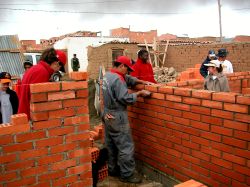
An interesting note on the construction: There was no ch'alla. When I asked the Habitat for Humanity leader why, he responded w/ "we believe that God's presence is enough." That may be true, but the altiplano tradition calls for a ch'alla where a llama fetus is buried under the foundation. He looked at me w/ that weird, familiar smile that made me instantly ask, "You're evangelical, aren't you?" Of course, he was.
Dinner & Octavia
04.04.2004Went out to dinner last night w/ M to Osteria Pettiroso. Amazing pasta dishes. She had noodles w/ duck & chocolate sauce; I had mine w/ clams & shrimp. After dinner, they brought courtesy grappa shots. From there, we made our way to Equinoccio, running into Jay & Matthew, as well as gathering up M's friend.
Continue reading "Dinner & Octavia"Posted by Miguel at 06:48 PM | Permalink
Al-Qaeda doesn't care what side you're on
04.03.2004A new al-Qaeda "hit list" is being taken very seriously by international leaders. Interestingly, it's clear that the list doesn't target only "coalition" members. You thought Spain's 3/11 was a result of Spain's involvement in the Iraq war? That opposing the war made you safe? Um. No. The list includes Canada, Germany, Greece, France, and even Sweden (opponents to the Iraq war). The list doesn't include Bulgaria, Poland, Japan (coalition members). Of course, "Jews" & "Christians" top the list.
Ten things I can't live without
04.03.2004I asked Nenad to come up w/ another "top favorites" list. This is what he came up with. So. With no further to-do. Here's the ten things I couldn't live w/o:
- Coffee. Lots of it. 24-hour coffee shops, too.
- Kaneda (my 12" PowerBook). If you name your laptop, you can't live w/o him.
- Broadband & wi-fi internet.
- My CD collection. Specifically, anything from March Records.
- My books. Not so much for the books themselves, but for all the margin notes I've written over the years.
- Lucia & The Motron (my mopeds).
- Hot showers.
- My comic book collection.
- My favorite pair of jeans.
- Electricity. And all that comes w/ it.
-----
OTHER LISTS: Here's Melli's list. Or add your list in the comments.
Decentralization via regional autonomies
04.03.2004As a participant in the Mallasilla conference on decentralization, I was a member of the grupo de taller that developed a model based on municipal governments. Conference participants were organized into three groups: a cultural-ethnic framework, a federalization framework, and a modest one based on the already-existing municipal governments. In the end, our workshop group went beyond a modest plan & adopted a semi-federalist framework. I'm quite happy w/ the model we proposed.
Continue reading "Decentralization via regional autonomies" at Southern Exposure
Posted by Miguel at 04:33 PM | Permalink
Blogging celebrities
04.02.2004After barely two months online, Wonkette (aka Ana Marie Cox) is popular enough to have a party thrown in her honor hosted by CNN's Peter Bergen. The former print journalist, now professional blogger, has changed the way politics is written about w/ her irreverent wit & brilliant observations. Kudos!
Also, Kinja, the latest Nick Denton (Wonkette's "publisher") creation has launched (still in Beta). It's a weblog portal. Basically, it takes RSS to the web. Kudos, again!
La Declaración de Mallasilla
04.02.2004After two very long days, the FES-ILDIS* conference on decentralization was productive. About 40-50 of us met at the La Paz Golf Club in Mallasilla (an upscale residential neighborhood in La Paz' Zona Sur) to discuss various decentralization models w/ a view to the upcoming Constituent Assembly. Hoping to produce some consensus to present publicly — the Declaración de Mallasilla.
Continue reading "La Declaración de Mallasilla"Busy, back soon
04.01.2004Spent the entire day (8-7) in Mallasilla at a conference on decentralization sponsored by FES-ILDIS. Tomorrow, too. Now I'm off to Sergio's despedida (going away party) on his last night before he moves to Japan. I'll catch up & update later. Ciao!
Posted by Miguel at 08:09 PM | Permalink
